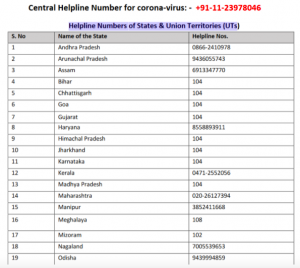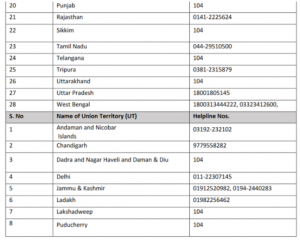The Covid-19 vaccine is developed in the following manner(( COVID-19 Vaccines Operational Guidelines, Ministry of Health and Family Welfare, accessed at https://main.mohfw.gov.in/newshighlights-31 (Page 18)):
| Phases of vaccine development or trial |
Purpose |
| Pre-clinical phase |
In this stage, the vaccine is developed in the laboratory. |
| Phase 1 Clinical trial (8-10 participants) |
Phase 1 is essential for testing the safety of the vaccine. |
| Phase 2 Clinical trial (50-100 participants) |
Phase 2 is essential for testing vaccine immunogenicity i.e. production of antibodies against viruses. |
| Phase 3 Clinical trial (30,000-50,000 participants) |
Phase 3 is essential for testing actual protection offered by the vaccine, i.e, based on a larger survey group. |
Once the vaccine clears phase 3 of the trial, it is eligible to get licensed and becomes available to the public on the basis of government guidelines.
The punishments for violating lockdown orders are:
| Offence |
Punishment |
| Negligently spreading the infection of disease |
The punishment is jail time of up to 6 months or/and fine(( Section 269, the Indian Penal Code, 1860)) |
| Running away from hospitals during and after the period of testing |
The punishment is jail time of up to 6 months or/and fine(( Section 269, the Indian Penal Code, 1860)) |
| Disobeying a public servant doing their duty |
The punishment is jail time of up to 1 month or/and a fine of Rs. 200(( Section 188, Indian Penal Code, 1860)) |
| Causing a riot or group fighting |
The punishment is jail time of up to 2 years or/and a fine(9 Section 147, Indian Penal Code, 1860)) |
| Causing danger to human life, health or safety |
The punishment is jail time of up to 6 months or/and a fine of Rs. 1000(( Section 188, Indian Penal Code, 1860)) |
The police can file an FIR if someone violates the laws given above. To read more on the First Information Report, see our explainer on FIR.
If someone is sharing fake news, there are several punishments they may face depending on the nature of the crime. For example, making up and sharing fake news on Covid-19 through Whatsapp can result in a person being punished under the law. Some other punishable offences are:
| Publishing or circulating any statement, rumour or report which may cause fear or alarm to the public. |
Section 505(1) of the Indian Penal Code, 1860 |
The punishment is jail time of up to 3 years and/or a fine. |
| False alarm regarding a disaster |
Section 54 of the Disaster Management Act, 2005 |
The punishment is jail time of up to 1 year or a fine. |
| Making a false claim for obtaining any relief, assistance, repair, reconstruction or other benefits consequent to disaster |
Section 52 of the Disaster Management Act, 2005 |
The punishment is jail time of up to 2 years and a fine. |
| Forwarding fake news |
Section 54 of the Disaster Management Act, 2005 |
The punishment is jail time of up to 1 year or a fine. |
Although there are many sources of false information on Covid-19, the most reliable sources of information are the following sources:
Information available in a State government’s website is also an authentic source of information. For example, Delhi’s Department of Health website.
Force majeure(( Sections 32 and 56 of the Indian Contract Act, 1872)) clauses are contractual clauses which can change or excuse the parties’ obligations and/or liabilities under a contract when an extraordinary event or circumstance beyond their control prevents one or all of them from fulfilling those obligations. For example, if a construction company had to do work for a private company, they can use the force majeure clause in their contract from stopping the work in case of a disaster like an earthquake etc.
Depending on how the contract is drafted, such clauses may have a variety of consequences, including:
- Excusing the affected party from performing the contract partially or fully .
- Excusing that party from delay in performance.
- Allowing them to suspend or claim an extension of time for performance.
- Giving that party a right to terminate the contract.
Force majeure can include events for which no person can be held accountable. Some examples include Act of God or natural disasters, war or war-like situations, human actions such as armed conflict etc. For a force majeure clause to be invoked, the acts must be unforeseeable, external to the parties of the contract, and unavoidable. The law relating to Force Majeure is given under Sections 32 and 56 of the Indian Contract Act, 1872.
Covid-19 and Force Majure
Whether a contractual obligation can be avoided on the grounds of force majeure is a factual determination based on the specific terms of the contract. The courts will examine, in each case, whether the impact of the Covid-19 pandemic prevented the party from performing its contractual obligation. Indian courts(( Energy Watchdog v. Central Electricity Regulatory Commission (2017)14 SCC 80; Naihati Jute Mills Ltd. v. Hyaliram Jaganath AIR 1968 SC 522.)) have generally recognised this concept and have enforced it where appropriate.
Directions by Government of India
The Government of India has taken the following measures to prevent further disruption in international trade and commerce by declaring the outbreak of Covid-19 as a force majeure event.
- The Ministry of Finance issued an office memorandum dated February 19, 2020 which states that Force Majeure clauses can be invoked in Government contracts if there is a “disruption in supply chain due to spread of coronavirus in China or any other country”. The Memorandum further states that COVID-19 should be considered as a case of “natural calamity”. On May 13, 2020, the Ministry of Finance issued another memorandum stating that under contracts for construction/works, goods and services and PPP (Public-Private Partnership) with Government Agencies, parties can invoke the force majeure clause ‘after fulfilling due procedure‘ and ‘wherever applicable’.
- Ministry of New & Renewable Energy has issued an Office Memorandum dated March 20, 2020 which directs all Renewable Energy implementing agencies of the Ministry of New & Renewable Energy (MNRE) to treat delay on account of disruption of the supply chains due to spread of Covid-19 in China or any other country, as Force Majeure event.
The government has launched helpline numbers and email addresses that one can approach in case of issues related to Covid-19 or for general information on the disease.
- National Helpline Number: +91-11-23978046 or 1075
- National Helpline Email ID: ncov2019@gov.in
- National Twitter Handle: @CovidNewsByMIB
- WHO WhatsApp Number: +41 798931892 (English)
For a list of helpline numbers specific to States, please see the table given below(( Coronavirus Helpline Number, Ministry of Health and Family Welfare, accessed at https://www.mohfw.gov.in/pdf/coronvavirushelplinenumber.pdf.))



